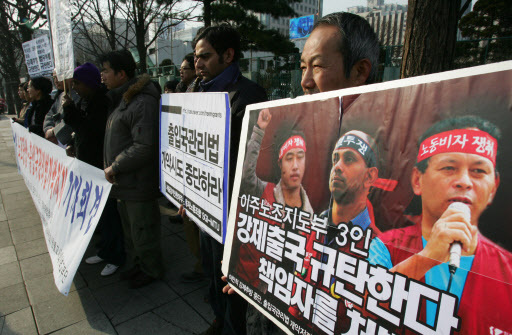South Korea’s highest court on Thursday upheld a ruling that illegal immigrants in Korea can establish a labor union.
The Supreme Court legalized the Seoul-Gyeonggi-Incheon Migrants’ Trade Union, invalidating the Ministry of Employment and Labor’s ban on its establishment.
The Supreme Court legalized the Seoul-Gyeonggi-Incheon Migrants’ Trade Union, invalidating the Ministry of Employment and Labor’s ban on its establishment.

In the ruling, the court said the ministry’s refusal to allow the organization to found a labor union was against the Constitution, upholding a lower court ruling.
The court ruled that illegal immigrants are entitled to joining and setting up a trade union though they do not have an official work permit, by recognizing anyone who offers labor and receives payment as a laborer in accordance with Korea’s labor law.
The historic ruling, which will protect basic workers’ rights of illegal immigrants from now on, came 10 years after the organization filed a suit in 2005.
In 2005, some 91 foreign workers based in Seoul, Incheon and Gyeonggi Province set up a trade union and requested for a permit from the labor ministry.
The ministry demanded the organization turn in its members’ registration numbers or passports to check their legal status in Korea, which was rejected by the MTU. The government then refused to accept the application, prompting the MTU to file a suit.
The lowest court ruled in favor of the ministry, but the appeals court overturned the decision by saying that workers’ rights stipulated in the constitution should not be restricted unless they harm the national security and public order.
By Ock Hyun-ju (laeticia.ock@heraldcorp.com)





![[Herald Interview] 'Amid aging population, Korea to invite more young professionals from overseas'](http://res.heraldm.com/phpwas/restmb_idxmake.php?idx=644&simg=/content/image/2024/04/24/20240424050844_0.jpg&u=20240424200058)











![[KH Explains] Korean shipbuilding stocks rally: Real growth or bubble?](http://res.heraldm.com/phpwas/restmb_idxmake.php?idx=652&simg=/content/image/2024/04/25/20240425050656_0.jpg&u=)

